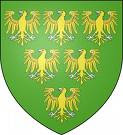Pressures of work have overtaken me lately, so that I’ve neglected Piers. However, I cannot let the month of June go by without posting about Piers' murder on Blacklow Hill.
Piers had first been exiled by Edward Ist, and recalled by his son when he became king. Piers was again exiled, this time to Ireland for bout a year, before Edward recalled him yet again. Edward had worked hard for Piers to be allowed to return, and within weeks of his arrival back in England, he regained his former titles and lands. The Vita records ‘Once he had been reinstated, his behaviour went from bad to worse. He showed his content for the barons by giving them vile nicknames. He took offices and dignities from others to bestow them on those close to him. The magnates of the land began to resent this, particularly the earl of Lancaster, because one of his retainers had been removed from office at the instigation of Piers’. In this particular post, I won’t discuss the charges of Piers taking offices etc. His so-called insulting nicknames may seem tame and childish in today’s society, but at the time, they infuriated the barons. Piers attacked their physical features, lineage and showed a real lack of respect. Why he chose to do this, we simply don’t know. It may have been a childish response to their lack of respect for him, possibly mocking his low birth. It my have been a way to entertain himself and Edward, and also to show them he wasn’t afraid of them. Lancaster was known as ‘the churl’ or ‘the fiddler’, mocking his lineage. Lincoln was ‘burst belly’, for obvious reasons. Pembroke was ‘Joseph the Jew’ and Warwick was ‘the dog of Arden’. The fact that these nicknames were recorded and seen as a genuine insult to the barons show how they must have wounded and stung them.
Armed with their evidence, the barons once again demanded that Piers be banished. Piers was ordered to leave from Dover by November 1st 1311. He was forbidden to take refuge in any of the king’s lands. England, Ireland, Wales, Ponthieu and Gascony were all forbidden to him. If Piers remained after November 1st in any of these lands, he was to be treated as the king’s enemy and to be arrested and punished.
Typically of Piers, he actually sailed 2 days later, and from the Thames. There is no way of knowing where Piers sailed to, but Flanders has been identified as a possibility. We also don’t know the intentions of Piers and Edward – though in my opinion, neither would have seen it as a permanent exile.
The Annales Paulini states Piers spent his exile in Flanders and returned to England shortly around Christmas. There seems to be much speculation as to how long he left England for, or if indeed, he ever did. I shall save this speculation for another post. Why did Piers return? He may not have taken the threat by the barons seriously, placing his faith in Edward. Perhaps Edward recalled almost immediately. And of course, his wife Margaret was expecting their first child. Piers would surely have wanted to be present at the birth. The canon of Bridlington records ‘Not long after Epiphany, he arrived, in the king’s company, in York, where the countess, his wife, gave birth to a daughter, for which he stayed there for some time’.
Piers Chaplais argues that Piers had come back for the birth of his daughter and no other reason, and would have surely headed back to his exile. He wasn’t defying the barons – it was simply a personal matter. And if this were indeed true, it makes his capture and murder poignant – well, it does for me.
I want to meet the anniversary of Piers’ death, and this means I won’t have time to go into detail of Edward and Piers ‘abandoning’ Isabella at Tynemouth and the siege at Scarborough. Those events will keep for another post. I will move on to the events at Deddington.
Sources – ‘Piers Gaveston, Edward II’s Adoptive Brother’ by Pierre Chaplain
‘Piers Gaveston, Earl of Cornwall, 1307 – 13 12’ by J. S. Hamilton
1 week ago



No comments:
Post a Comment